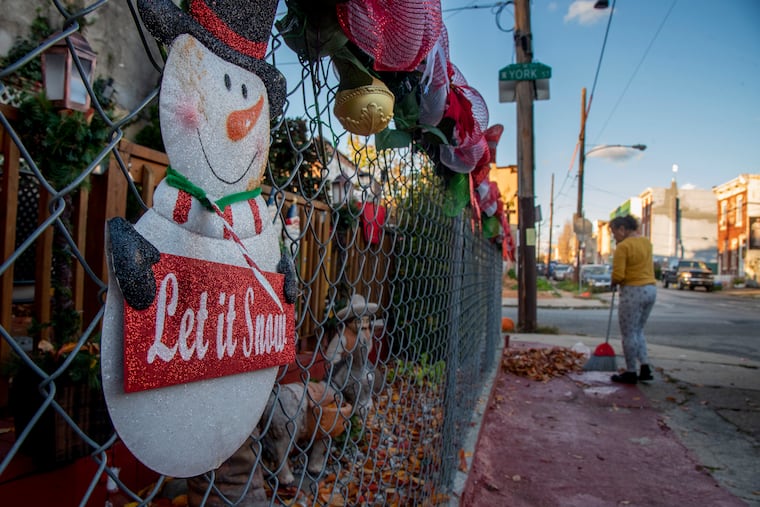Pa. spent months as an electoral hot spot. Now it’s the weather that’s bringing the heat.
For the first time on record, Philly has had four straight November days of 75-degree readings. The nation remains deeply divided: freezing in California, baking in Caribou.

At this rate, vestiges of the lingering leaves might even outlast election challenges.
With an official high of 76 Tuesday Philadelphia set a record for the date, and it marked the fourth consecutive day of 75-plus temperatures in the city, unprecedented for a November in records dating to 1874.
In addition, this was only the fourth time that the temperature had reached 70 or better on five consecutive November days in the city.
“It’s certainly been an impressive stretch,” said Jonathan O’Brien, a meteorologist with the National Weather Service Office in Mount Holly. But relative to normal, it’s been even warmer to our north. The high Tuesday in Caribou, Maine, 75, beat the standing record by 12 degrees and was its normal high for July 4.
Another daily record could fall in Philly on Wednesday, O’Brien said, with highs in the low 70s.
“It’s certainly hard to believe,” said Ryan Reed, a forestry specialist with the Pennsylvania Department of Conservation and Natural Resources, adding that the warm spell might be more prominent on the public radar were it not for some other recent high-profile events. “It’s kind of on the back burner in terms of news, no pun intended."
The deer are not particularly happy about temperatures that would be normal for middle to late May (although it might be saving their lives) nor is Reed, an “avid hunter.” He also is concerned about how the general trends of increasing warmth are affecting the health of forests.
In the short term, however, for energy consumers it has meant early-season savings. For outdoor activities, and dreaded chores such as raking, it doesn’t get much better. The warmth should continue to delay leaf-fall, making the piles more manageable.
» READ MORE: Peak foliage is arriving in Philly, and it could linger into November
While Pennsylvania, and Philadelphia in particular, were electoral hotspots for months, that evidently is unrelated to the post-Election Day warm spell. It’s all over the East. Temperatures deep into the 70s set records in Syracuse, Cleveland, and Chicago on Tuesday. On its sixth straight day of 70-plus readings, Erie made it all the way to 79, besting the old record by 11 degrees.
Such stretches are at the very least highly unusual. The last time Philadelphia had five straight days of 70-plus was in 1990, during the administration of President George H.W. Bush. It happened on Nov. 1, 2, 3, and 4 when his son was in office, in 2003.
Going back further, according to National Weather Service records, in 1938, during the Roosevelt administration, the highs reached 70-plus in a five-day stretch ending Nov. 8, and in 1975, when Gerald Ford was president, highs were 70 or better on eight of nine days starting on Nov. 2.
What’s behind the warmth?
The weather service posted freeze advisories for Wednesday morning for parts of Southern California and winter-weather advisories were up for other parts of the West.
The United States was a nation divided Tuesday, with the West quite cold and roughly the Eastern half of the country on the warm side. The battleground states extended from Minnesota to New Mexico.
» READ MORE: Expect warm weather, with above normal temperatures, this winter in Philly
Lower pressure in the upper atmosphere, which favors cold and storminess, has settled over the West, while it’s the opposite in the East, said Dave Dombek, senior meteorologist with AccuWeather Inc. This is a familiar dichotomy. Areas of high and low pressure alternate around the planet, and given geographic extents, if it’s cold in the West this time of year, it’s going to be warm around here.
The warmth here also is likely getting a boost from Eta, the record-tying 28th “named” tropical storm of the season. Eta’s remnants on Monday were headed for the north Gulf Coast, and its low central pressure was adding heft to the high affecting the East. (A 29th storm, Theta, is heading in the other direction.)
What’s next?
“You can’t keep it this warm forever,” Dombek said. After making a run at the daily record, 74, on Wednesday, heavy rains into Thursday — perhaps as much as 3 inches, said O’Brien — might touch off minor flooding, the weather service says, followed by something resembling November.
Reed said that given the warmth, and the recent run of milder falls, “I worry about the changing physiology of the response in our trees."
He said that if a tree gets fooled into pushing buds right now, “a cold spell will cause damage.”
» READ MORE: Some of Pennsylvania’s iconic tree species might not survive climate change
On a personal level, he said, this warmth has been particularly frustrating. “I’m an avid hunter, and it’s just kind of taking all the wind out of my sails,” he said.
Now that they have donned their winter coats, deer don’t like the heat, and they have less interest in coming out to forage for food. Plus, warmth kind of kills the mood, so they are less likely to indulge in reckless, hormonally induced behavior.
But there is some benefit in that for the deer, and for motorists.
Said Reed, “There’s probably fewer collisions with deer."
And as long as the leaves hang touch, the setting sun will turn the rust to gold.